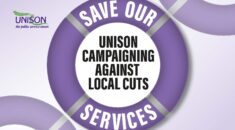UNISON has presented a blueprint to improve trading standards services, devised by trading standards officers, to councils and Ministers across Great Britain.
The blueprint forms part of a pair of new reports, compiled as part of The Damage, the union’s far-reaching investigation into the impact of the government’s austerity measures on both trading standards and environmental health services.
The reports show that officers believe that massive budget cuts are destroying their services. There is an urgent need for more investment, before it’s too late. They have also come up with a 20-point checklist for improving effectiveness, with simple steps that include:
Investment in preventative inspection work and consumer education More regional enforcement resources Better joint working with other authorities, with the sharing of specialist expertise and equipment, and Rationalisation with other services – such as a combined food chain section with environmental health to tackle all food issues root and branch.
Proposals aimed at government ministers include a nationally funded intelligence database, and the reinstatement of the Office of Fair Trading to pursue big cases.
Heather Wakefield, UNISON head of local government, said: “Environmental health and trading standards are ‘invisible services’ – the public are only really aware of them when things go wrong – so these reports are a timely recognition of the situation the hard working staff in both these services are facing day-in day-out.
“The bitter irony of the government’s attack on these services is that, when they operate with adequate staff and resources, they actually benefit the economy. Trading standards services generate £6 of savings for every £1 that is spent on them, while environmental health services can help legitimate businesses flourish by ensuring they are safe and clean.”
“This blueprint demonstrates that the officers know what needs to be done to keep these services alive, and keep the public safe. Government and councils should take our findings seriously, and act on them to ensure these vital services are able to continue into the future.”
Environmental health officers have also proposed steps that could be introduced the protect the service in the long term, including:
Research into the effectiveness of long term prevention of environmental health issues, and Undertaking a local and national public awareness campaign promoting the benefits provided by environmental health services Reverse the decline in the number of environmental health officer traineeships
Both services have been hit hard by budget cuts, which have led to massive reductions in staffing levels and activity across the board.
Trading standards have seen a 15% reduction to the workforce, which has resulted in a 26% drop in scheduled inspections, and a drop of almost 30% in new prosecutions.
Environmental health has seen a total of 1,272 jobs lost, the knock-on effect being that 2011/12 saw a 15% reduction in enforcement notices issued; a 4% reduction in enforcement visits; and an 8% reduction in scheduled inspections.
Officers’ warnings included:
“Optional preventative services have been reduced such as provision of advice during business start-up…this [means] more remedial regulatory work to do in the future”
“You can’t do this work without enough staff. [X] council now has just two TS Officers for the whole borough. They literally cannot do anything. ”
The reports can be found here:
Trading standards Summary report: www.unison.org.uk/acrobat/21254.pdf Full report: www.unison.org.uk/acrobat/21253.pdf Statistical evidence: www.unison.org.uk/acrobat/21255.pdf
Environmental health Summary report: www.unison.org.uk/acrobat/21257.pdf Full report: www.unison.org.uk/acrobat/21256.pdf Statistical evidence: www.unison.org.uk/acrobat/21258.pdf
ENDS






